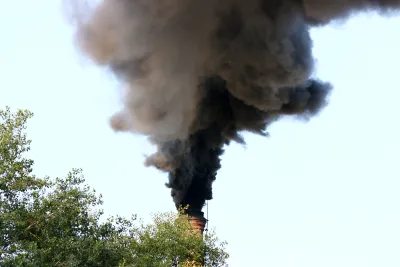The agency cites health risks of air pollution as reason for the new limit; states appear concerned it will kill their economies.

This week a group of 24 states filed a lawsuit against the U.S. Environmental Protection Agency’s new air pollution limits. The rule, announced last month, updated national air-quality standards for the first time in twelve years, significantly lowered limits for annual particulate matter (commonly referred to as soot) from 12 micrograms per cubic meter to 9. According to an article from The Hill, the new soot limits are slated to take effect in 2023, at which point states that do not meet the limit would be required to implement policies to improve PM2.5 levels.
“The EPA estimates that in that year, compliance costs could be $590 million. But it estimated that health benefits could be worth between $22 billion and $46 billion and include up to 4,500 lives saved,” reports Rachel Frazin.
Though the lawsuit does not outline states’ reasons for suing, Frazin points to a press release from Kentucky Attorney General Coleman that suggests they are suing on the grounds that the rule could drive jobs and investment out of their states.
The Biden administration’s rule change comes as national or global conversations around air quality and pollution’s role in poor health outcomes — particularly in poor communities and communities of color — have heated up. Earlier this year, a report from the First Street Foundation found that roughly 25 percent of Americans live in places with unhealthy air quality, which is only being exacerbated by climate change, and Redfin announced that it will be adding an air quality score to the data it provides on home listings.
FULL STORY: 24 states sue EPA over air pollution limit

National Parks Layoffs Will Cause Communities to Lose Billions
Thousands of essential park workers were laid off this week, just before the busy spring break season.

Retro-silient?: America’s First “Eco-burb,” The Woodlands Turns 50
A master-planned community north of Houston offers lessons on green infrastructure and resilient design, but falls short of its founder’s lofty affordability and walkability goals.

Delivering for America Plan Will Downgrade Mail Service in at Least 49.5 Percent of Zip Codes
Republican and Democrat lawmakers criticize the plan for its disproportionate negative impact on rural communities.

Test News Post 1
This is a summary

Test News Headline 46
Test for the image on the front page.

Balancing Bombs and Butterflies: How the National Guard Protects a Rare Species
The National Guard at Fort Indiantown Gap uses GIS technology and land management strategies to balance military training with conservation efforts, ensuring the survival of the rare eastern regal fritillary butterfly.
Urban Design for Planners 1: Software Tools
This six-course series explores essential urban design concepts using open source software and equips planners with the tools they need to participate fully in the urban design process.
Planning for Universal Design
Learn the tools for implementing Universal Design in planning regulations.
EMC Planning Group, Inc.
Planetizen
Planetizen
Mpact (formerly Rail~Volution)
Great Falls Development Authority, Inc.
HUDs Office of Policy Development and Research
NYU Wagner Graduate School of Public Service




























